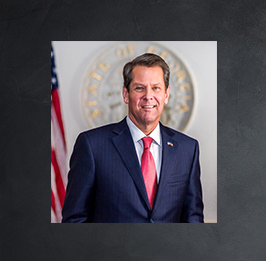
Governor Brian Kemp Op-Ed:
While travelling across our state, I am proud to highlight how Georgia is the best place to live, work, and raise a family. Thanks to our strong, conservative policies, the Peach State economy continues to grow and thrive – despite a global pandemic.
This year, Georgia has been named the Top State for Business for the eighth year in a row, and recently we were ranked as the Best State to Start a Business because of our hard work to protect both lives and livelihoods. Since 2019, together we have helped create economic opportunities for Georgians in every corner of our state.
As your Secretary of State and Governor, I have traveled to all 159 counties. I toured family farms using technology to enhance productivity, watched young entrepreneurs launch start-ups to meet local needs, and celebrated major companies repurposing dormant buildings for world-class manufacturing. From Valdosta to Calhoun, businesses large and small from around the world have made their new home in the Peach State.
Delivering on a promise I made on the campaign trail, we have worked with the Georgia Department of Economic Development (GDEcD) to develop and launch our Rural Strike Team. This partnership is bringing local developers, elected officials, and industry leaders together to encourage businesses to invest and take advantage of opportunities in rural Georgia.
In addition to the Strike Team, this year, my budget proposal included $40 million for a new Rural Innovation Fund that will provide accessible capital to start-ups, existing industries, and local job creators in rural communities across our state.
I am proud of the record number of new projects announced in rural Georgia, significant increases in jobs and investment, and new partnerships that will ensure we work together to bring prosperity to every region of the Peach State. But we cannot take our foot off the gas – there is still more work to be done.
Over the years, I have heard from countless Georgians about the difficulties they face accessing reliable high-speed internet.
These conversations range from business owners looking to connect with customers, students and teachers needing reliable access to virtual classrooms, patients seeking access to tele-health services, and congregations trying to watch a service on Sundays. When the COVID-19 pandemic hit, the necessity of high-speed broadband access was driven home to all of us. This is no longer an optional service for many families – it is an essential need that impacts kitchen tables from Hahira to Hiawassee.
Under the Gold Dome in 2019, working with members and leadership of the General Assembly, we took a significant step toward overcoming this obstacle by signing Senate Bill 2 into law. This new law encouraged EMCs and community leaders to work together to develop creative solutions to close the digital divide in our state.
Now, we are seeing the direct results of this important legislation.
Over the past five months alone, my office – in coordination with local leaders, the Public Service Commission, and private sector partners – has announced six different EMC partnerships to expand broadband access to over 178,000 homes and businesses in rural Georgia. Over the past year, we’ve worked together to provide reliable internet to 44 counties, totaling over $491 million of investment by local governments, state partners, and 16 Georgia EMCs. I’m thankful to everyone who has been involved throughout the process.
After the passage of SB2 in 2019, Georgians in Appling, Atkinson, Bacon, Baldwin, Bibb, Brantley, Butts, Clayton, Coffee, Coweta, Crawford, Dooly, Emanuel, Fayette, Glascock, Hancock, Henry, Houston, Jasper, Jeff Davis, Jefferson, Johnson, Jones, Lamar, Laurens, Macon, Meriwether, Monroe, Morgan, Newton, Pierce, Pike, Pulaski, Putnam, Spalding, Turner, Twiggs, Upson, Ware, Warren, Washington, Wayne, Wilcox, and Wilkinson counties will now have expanded access to high-speed internet in their local communities.
On the campaign trail, I told people that I would put hardworking Georgians first and strengthen rural communities across our state. In the first two and a half years of my first term, we have made incredible progress doing just that.
In the months to come, my office will be exploring every opportunity to utilize federal coronavirus relief funds to continue our momentum on expanding access to high-speed internet – no matter your zip code.
Together, we will continue to tackle this problem head on and bring greater opportunities and economic prosperity to rural Georgia.


Bulloch Public Safety
03/02/2026 Booking Report for Bulloch County

Chattooga Local News
Most Recent Chattooga County Food Service Inspections

Bulloch Public Safety
02/09/2026 Booking Report for Bulloch County

Bulloch Public Safety
02/16/2026 Booking Report for Bulloch County

Bulloch Public Safety
02/20/2026 Booking Report for Bulloch County

Bulloch Public Safety
02/17/2026 Booking Report for Bulloch County

Bulloch Public Safety
02/02/2026 Booking Report for Bulloch County







